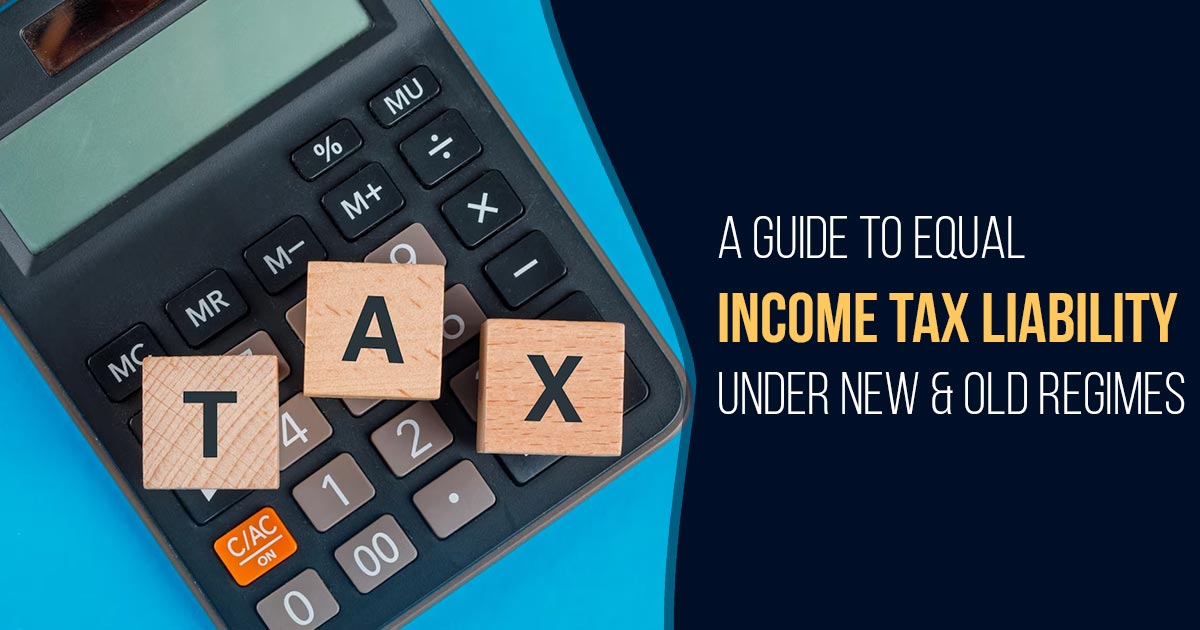
The Finance Minister has decided to reform tax rates as long as the new tax regime is considered. It is expected to be better than the existing tax system because of the standard deduction which was not given in the earlier tax regime. Despite the debate on whether the new tax regime is much better than the previous one, the cases may be different if the fresh one is put in for comparison with the old tax system after counting eligible expenditures and long-term investments.
Income Tax Calculation As Per New and Old Tax Regimes
It depends on an individual’s income and the deduction/exemptions given to choose between the old tax regime and the new tax regime. The proposed new tax system would bring more benefits to an individual who has a deduction under section 80C of Rs 1,50,000. However, the old tax system would be advantageous to an individual who has a housing loan and other deductions. If the entire deduction observed is 4,08,333, it seems that the tax under both regimes remains the same for a total income of Rs. 15,00,000 and more than that. The revised new tax regime will be beneficial for the taxpayers whose earnings liable to tax is more than Rs. 5 Crore because of a deducted overcharge of 25 per cent, said Neeraj Agarwala, Partner, Nangia Andersen LLP.
If we talk about the calculation, on the deduction of Rs 4.08 lakh which also counts as the standard deduction of Rs 50,000, Rs 2 lakh interest deduction on a home loan, Rs 1.5 lakh tax deduction under section 80C, Rs 25,000 under section 80D for health insurance (to equate tax under both regimes we have taken it 8,333), the tax liability remains same for total earnings of Rs 15,00,000 and more.
Comparison Between Old and New Tax Regimes
| Tax Income | Income Tax Liability Under Old Regime | Tax Liability Under Revised New Regime | Saving | What is Better? |
|---|---|---|---|---|
| 10,00,000 | 32,067 | 52000 | 19,333 | Old |
| 11,00,000 | 52,867 | 67600 | 14,733 | Old |
| 12,00,000 | 73,667 | 83200 | 9,533 | Old |
| 15,00,000 | 1,45,600 | 145600 | 0 | Both |
| 16,00,000 | 1,76,800 | 176800 | 0 | Both |
| 20,00,000 | 3,01,600 | 301600 | 0 | Both |
| 25,00,000 | 4,57,600 | 457600 | 0 | Both |
| 30,00,000 | 6,13,600 | 613600 | 0 | Both |
| 35,00,000 | 7,69,600 | 769600 | 0 | Both |
| 40,00,000 | 9,25,600 | 925600 | 0 | Both |
| 45,00,000 | 10,81,600 | 1081600 | 0 | Both |
| 50,00,000 | 12,37,600 | 1237600 | 0 | Both |
| Note: A deduction against the standard deduction, home loans, 80C, 80D, 80G, 80E, etc., is considered Rs. 4,08,333 lakhs. *Deduction against a Standard deduction | ||||
In the new tax system, you are not allowed to get deductions like 80C, 80D, and 24B whereas, in the old regime, you are allowed to deduct your taxable earnings by managing deductions and exemptions. This is the major difference between the proposed new and old tax regimes.
Income Tax Benefits Under Old and New Tax Regimes
The new tax regime appears more beneficial for the one who does not have investments to claim as tax deductions. But people with an income below 15 lakhs and benefit from deductions such as interest on home loans, health insurance, and PPF will be required to estimate as per their situation.
But the old tax regime could prove to be more efficient. Things may be different according to the situation. However, under the new regime, both people in the high-income range and people who do not have required investments would be beneficial.
Important: A Summary of Tax Calculator with Pros Under New Tax Regime
The most exciting news is that the tax rebate u/s 87A limit will be Rs 7 lakh under the new tax regime. Therefore, people with a total income of up to Rs 7 lakh are not required to pay taxes as per the new regime.
At present, people with income below Rs. 5 lakh, do not required to pay any income tax in both regimes. Nirmala Sitharaman said in the budget speech that the tax rebate limit is increased to Rs 7 lakh under the new regime. No tax for people with a total income up to Rs. 7 lakhs.
The Finance Minister further added that this is a great relief to all the taxpayers. If a person has an annual income of Rs 9 lakh, only Rs 40,000 will be needed to pay as tax which counts a mere 4.44 per cent of the income. It is a deduction of 36 per cent (after claiming ₹1,50,000) from what he used to pay earlier. Also, a person with an income of Rs 15 lakh would be liable to pay only Rs 1.4 lakh or 10 per cent of the income which is 20 per cent of the liability of Rs 1,87,500 at present.









